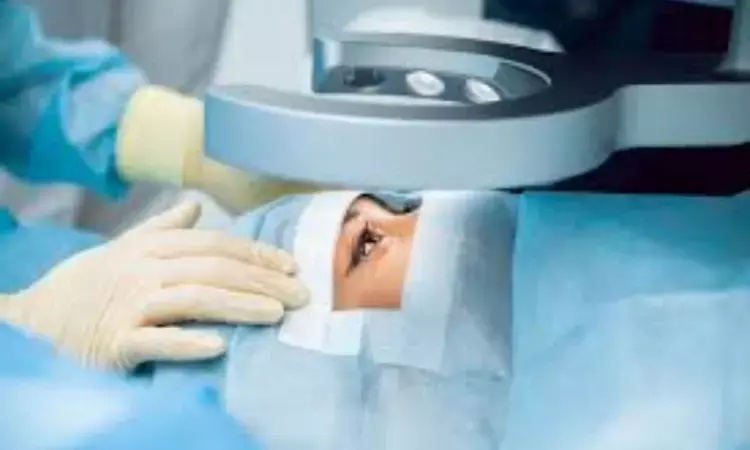- Home
- Medical news & Guidelines
- Anesthesiology
- Cardiology and CTVS
- Critical Care
- Dentistry
- Dermatology
- Diabetes and Endocrinology
- ENT
- Gastroenterology
- Medicine
- Nephrology
- Neurology
- Obstretics-Gynaecology
- Oncology
- Ophthalmology
- Orthopaedics
- Pediatrics-Neonatology
- Psychiatry
- Pulmonology
- Radiology
- Surgery
- Urology
- Laboratory Medicine
- Diet
- Nursing
- Paramedical
- Physiotherapy
- Health news
- Fact Check
- Bone Health Fact Check
- Brain Health Fact Check
- Cancer Related Fact Check
- Child Care Fact Check
- Dental and oral health fact check
- Diabetes and metabolic health fact check
- Diet and Nutrition Fact Check
- Eye and ENT Care Fact Check
- Fitness fact check
- Gut health fact check
- Heart health fact check
- Kidney health fact check
- Medical education fact check
- Men's health fact check
- Respiratory fact check
- Skin and hair care fact check
- Vaccine and Immunization fact check
- Women's health fact check
- AYUSH
- State News
- Andaman and Nicobar Islands
- Andhra Pradesh
- Arunachal Pradesh
- Assam
- Bihar
- Chandigarh
- Chattisgarh
- Dadra and Nagar Haveli
- Daman and Diu
- Delhi
- Goa
- Gujarat
- Haryana
- Himachal Pradesh
- Jammu & Kashmir
- Jharkhand
- Karnataka
- Kerala
- Ladakh
- Lakshadweep
- Madhya Pradesh
- Maharashtra
- Manipur
- Meghalaya
- Mizoram
- Nagaland
- Odisha
- Puducherry
- Punjab
- Rajasthan
- Sikkim
- Tamil Nadu
- Telangana
- Tripura
- Uttar Pradesh
- Uttrakhand
- West Bengal
- Medical Education
- Industry
Eye protection after cataract surgery reduces self reported symptoms, improves clinical signs

Cataract Surgery
In a new study, it has been shown that patients who received an ocular bandage after cataract surgery had far fewer complaints than those who received immediate eyesight. Patients would rather have some type of postoperative protection than quick eyesight.
This study was conducted by Arjan S Dhoot and team, findings of which are published in the Canadian Journal of Ophthalmology.
The usage of postoperative eye protection varies greatly among ophthalmologists. Treatment options for postoperative eye protection include an eye shield, an eye patch, an ocular bandage, and immediate eyesight. The goal of this study was to analyze and compare the information on various eye protection alternatives.
For this study, Original comparative articles that reported on subjective symptoms (e.g., foreign-body sensation, photophobia, tearing, and pain) and postoperative outcomes (e.g., tear film breakup time, best-corrected visual acuity, etc.) after using an eye protection method were included in a systematic literature search.
The key findings of this study are:
1. In all, 598 eyes were included throughout 8 papers. Postoperative ocular bandages (n = 6), eye patches (n = 4), immediate vision (n = 2), and eye shields (n = 1) were all studied.
2. Patients receiving ocular bandages self-reported symptoms such as discomfort (n = 3), foreign-body sensation (n = 4), photophobia (n = 3), and tears (n = 3) at a lower or equal rate when compared to alternative treatment methods in 5 trials.
3. Three studies found that the ocular bandage enhanced tear film breakdown time, and one research found that it improved corneal wound healing when compared to a control group.
4. Two studies found that the eye patch had a shorter tear film breakup time than the ocular bandage, while another found that immediate vision had a shorter tear film breakup time than the eye patch.
In Conclusion, This review of the literature reported that, when compared to patients who received no eye protection after cataract surgery (dubbed "instant vision"), those who received postoperative eye protection (eye shield, eye patch, or contact lens bandage) had lower self-reported symptoms and improved clinical signs. Further studies are needed for postoperative eye protection after cataract surgery.
Reference:
Dhoot AS, Popovic MM, Lee S, El-Defrawy S, Schlenker MB. Eye protection following cataract surgery: a systematic review. Can J Ophthalmol. 2021 Dec 1:S0008-4182(21)00396-3. doi: 10.1016/j.jcjo.2021.11.001
Medical Dialogues consists of a team of passionate medical/scientific writers, led by doctors and healthcare researchers. Our team efforts to bring you updated and timely news about the important happenings of the medical and healthcare sector. Our editorial team can be reached at editorial@medicaldialogues.in.
Dr Kamal Kant Kohli-MBBS, DTCD- a chest specialist with more than 30 years of practice and a flair for writing clinical articles, Dr Kamal Kant Kohli joined Medical Dialogues as a Chief Editor of Medical News. Besides writing articles, as an editor, he proofreads and verifies all the medical content published on Medical Dialogues including those coming from journals, studies,medical conferences,guidelines etc. Email: drkohli@medicaldialogues.in. Contact no. 011-43720751


